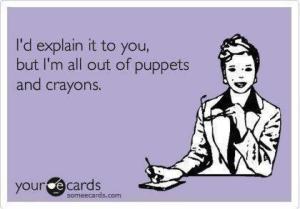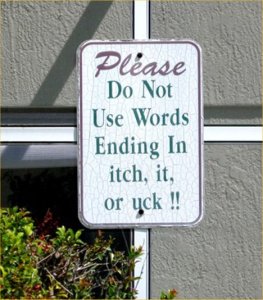 Being an autism parent, no matter where your kid falls on the spectrum, is not an easy ride. When you factor in other people’s offerings or responses, the result can be frustrating or even heartbreaking.
Being an autism parent, no matter where your kid falls on the spectrum, is not an easy ride. When you factor in other people’s offerings or responses, the result can be frustrating or even heartbreaking.
I’ve come to believe that, when it comes to any sort of disability, there are four kinds of people out there:
1/ People who either have a disability, or are related to someone who does.
2/ People who may not be either of the above, but are knowledgeable and understanding anyway.
3/ People who have no direct experience, who are ignorant but well-meaning.
4/ People who are just plain assholes.
In my 5 1/2 years of being a special needs parent, I’ve encountered all three of the other types of people out there. If I know that they aren’t trying to be jerks, I do my best to be polite. Sometimes, though… I really wish I had the balls to say what I’m thinking, out loud.
Since I’m not that sort of person in real life, I figured I’d put together a list- a list of the worst things I hear as an autism parent, including how I usually respond and what I would really like to say.
Fair warning: my attitude’s showing.
1. “All kids do that”, or “All kids have weird fears.”
How I Respond:
“I guess so, to some degree.”
What I’d Really Like to Say:
“Really? Are your kids afraid of dandelions? Do your kids cover their ears, or slap their head when they’re upset? Do your kids break into screaming and crying fits when you brush their hair gently?”
2. “That’s funny, they don’t look Autistic”, or “I never would have known!”
How I Respond:
“You really have to spend some time with them to notice.”
What I’d Really Like to Say:
“Funny you should say that, because you don’t look like an idiot.”
3. “It could be worse”
How I Respond:
“Yeah, I guess so.”
What I’d Really Like to Say:
“I know there are kids who are lower functioning. I know there are parents with more than two special needs kids. I know there are kids in wheelchairs. I know there are fucking starving kids in fucking Africa. I’m expressing frustration, and what you’re doing is the opposite of helping.”
4. “He/she’ll outgrow it.”
How I Respond:
“You don’t outgrow Autism, you just learn how to thrive in spite of it.”
What I’d Really Like to Say:
“Do you have any idea how much therapy and extra teaching will go into turning my kids into fully functioning, independent adults? They don’t outgrow it- we just teach them how to work around it.”
5. “He/ She’s so cute. It’s a shame about the Autism.”
How I Respond:
“Why is it a shame?”
What I’d Really Like to Say:
“Why is it a shame? My kids are pretty awesome little people, if you give them a chance. They’ve just got a different way of expressing it.”
6. “They’re just trying to get attention.”
How I Respond:
“I know what ‘trying to get attention’ looks like, thanks.”
What I’d Really Like to Say:
“Really? Because I thought that all the inconsolable screaming, crying, ear-hitting was a meltdown. My kid is having a sensory-overload meltdown, you ass. They aren’t ‘trying to get attention’.”
7. “Don’t Autistic people have special talents, or something?”
How I Respond:
“Sometimes they can appear to be talented in one particular area, like anyone else.”
What I’d Really Like to Say:
“Sure. My daughter can fly, and my son can shoot fireballs out of his eyes.”
8. “I don’t know how you handle it/ I couldn’t deal with that.”
How I Respond:
“It’s stressful, but we just keep pushing forward.”
What I’d Really Like to Say:
“How do you know? Have you tried it?”
9. “Like Rain Man?”
How I Respond:
“Um… no.”
What I’d Really Like to Say:
“You know, I enjoyed that movie. It really did a lot to raise awareness for people with Autism and other learning and sensory disorders. The problem is, now everybody thinks all Autistic people are like the fellow on Rain Man. Seriously, crack open a book, or at least Google it.”
10. “Everyone’s a little Autistic”, or “She/he’s just being a kid.”
How I Respond:
“Seriously?”
What I’d Really Like to Say:
“Oh, well that makes it O.K then. By the way, thanks for undermining our struggle.”
11. “Let them stay with me for a while- I bet I can fix them.”
How I Respond:
“Thanks, but we’re handling it.”
What I’d Really Like to Say:
“Is there someplace you can go to fix your attitude?”
12. “There’s a word for that kind of behaviour: brat.”
How I Respond:
“My kids aren’t being brats, they’re just having a bad day.”
What I’d Really Like to Say:
“There’s a word for your kind of behaviour: asshole.”
13. “It’s nothing a good spanking won’t fix.”
How I Respond:
“You can’t beat the Autism out of a child, you jerk.”
What I’d Really Like to Say:
“I’m guessing your parents didn’t succeed in spanking the asshole out of you.”
14. “So he/she’s a retard?”
How I Respond:
“No, he/she is Autistic. Please don’t use that ugly word when referring to my children.”
What I’d Really Like to Say:
“That’s funny, I didn’t think my kids were even related to you.”
15. “He/she’s one of God’s special little children.”
How I Respond:
“I guess so.”
What I’d Really Like to Say:
“Why? Why should my kids be considered any different from any other kid? Sure, they’re special to me, but they shouldn’t be put on a pedestal or set apart from other children.”
16. “I hear it comes from the Dad.”
How I Respond:
“Well, that’s one theory.”
What I’d Really Like to Say:
“Well, that’s one theory…out of literally hundreds.”
17. “I’m sorry to hear that.”
How I Want to Respond:
“Thanks, but we’ve got a handle on it.”
What I’d Really Like to Say:
“Why are you sorry? My kids are awesome.”
18. “You must really have your hands full.”
How I Respond:
“You bet!”
What I’d Really Like to Say:
“Doesn’t any parent?”
19. “He/she can’t be Autistic, because he/she speaks.”
How I Respond:
“Yes they can. Not all people with Autism are non-verbal.”
What I’d Really Like to Say:
“Oh. Well, I guess she’ll just have to stop talking, so that everyone will believe me when I tell them.”
20. “You won’t even be able to notice they are Autistic, when they are older.”
How I Respond:
“One can only hope.”
What I’d Really Like to Say:
“Do you know how many hours of therapy and specialized teaching they have already gone through? Do you know how many hours they will have to go through between now and adulthood, just to be able to function normally, like everyone else?”
21. “Everyone is Autistic these days.”
How I Respond:
“Um… I guess so.”
What I’d Really Like to Say:
“The reason it seems like everyone is Autistic these days is because it’s being researched and diagnosed better. We have better tools and tests, and are able to properly diagnose those people who, only a generation ago, might have been considered a dreamer, anti-social, or severely mentally disabled.”
22. “God only gives you what you can handle.”
How I Respond:
“I guess so.”
What I’d Really Like to Say:
“I really wish God would see fit to send a babysitter my way every so often, so my partner and I can take a break from what God thinks we can handle.”
23. “Did you get him/her vaccinated as a baby? I heard that vaccines can cause Autism.”
How I Respond:
“Yes I have, and that’s only one theory as to what causes Autism.”
What I’d Really Like to Say:
“There isn’t enough conclusive evidence to support that theory, actually. Frankly, even if it were true, I’d rather have kids with Autism than kids who die preventable deaths because they weren’t vaccinated properly.”
24. “Does he/she ever sit still or stop talking?”
How I Respond:
“Sometimes, but they are naturally very busy and chatty.”
What I’d Really Like to Say:
“Do you ever stop being an ass?”
25. “What end of the spectrum is he/she on?”
How I Respond:
“They are high-functioning.”
What I’d Really Like to Say:
“Why does that matter? Will it make you treat them differently?”
Well, there you have it: the things that make the Momma Bear in me come out.
 I used to be a lot more shy than I am now, and a lot less inclined to swear, when I was younger.
I used to be a lot more shy than I am now, and a lot less inclined to swear, when I was younger.

